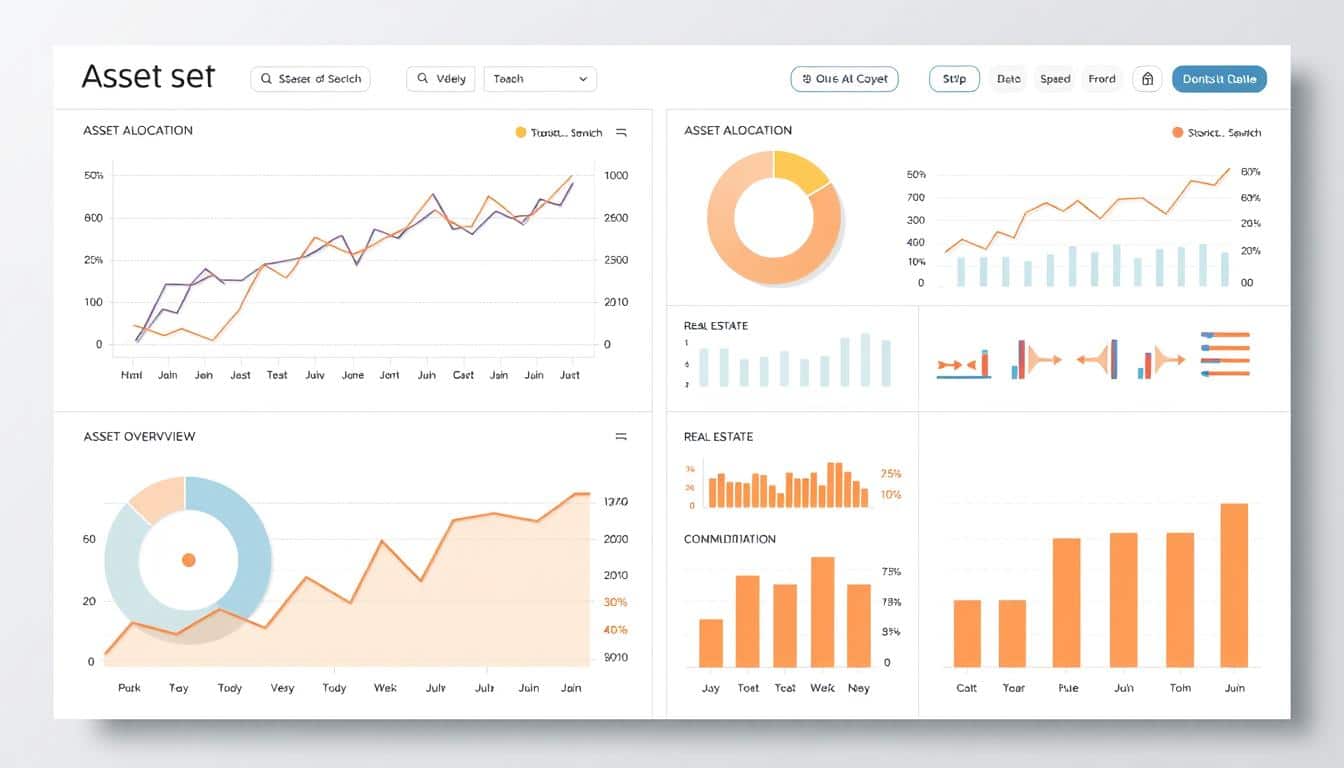In our busy world, learning smart ways to manage money is key to being financially stable and meeting your long-term goals. These methods help people effectively control their finances. This article will share useful tips on how to handle your money for a secure future.
It will show how to spend wisely and save well, linking your spending to your financial dreams. Knowing how important it is to manage your money and using these strategies can lead to financial freedom and peace of mind.
Anúncios
Understanding the Importance of Money Management
Managing money well is key to good financial health and reaching your money goals. It helps you keep track of what you earn and spend. This way, you make smarter decisions about how to use your money.
Saving money for tough times and future plans becomes possible. Knowing how to manage your money well can cut down stress. It also makes life better.

Patrice Washington, a financial expert, stresses the importance of having money goals that match your values. When you do this, you’re likely to see better results with your finances. It’s crucial to know where your money comes from and where it goes. This knowledge is key to becoming great at handling your money.
The Basics of Financial Planning
Financial planning is key for reaching your money goals. It starts with checking your income, bills, and debts. Understanding your worth and cash flow helps see where you stand and what you need for the future.
Some key parts of starting a financial plan are:
- Setting real money goals for different parts of your life.
- Making a detailed budget to keep spending in check.
- Putting money in retirement funds for later life income.
- Looking at insurance to guard your stuff and health.
It’s important to keep checking and tweaking your financial plan. Staying up to date with your goals helps. Changing your plan as life changes improves your financial health and success.
Setting Financial Goals for Long-Term Success
Having clear financial goals is key for long-term achievements. When you set financial goals, they match up with what’s important to you. These goals might be buying a house, saving for later life, or setting aside money for emergencies.
It helps to sort your goals into different types. This makes it easier to make plans. The types usually are:
- Short-term objectives (within a year)
- Medium-term objectives (one to five years)
- Long-term objectives (five years and beyond)
Checking your goals regularly is important. Life changes and so do your needs. This means you can stay on track with your financial plans.
Developing Effective Money Management Strategies
Handling money wisely is key to staying financially stable and reaching your dreams. It starts with making a detailed plan for spending that matches what matters to you.
Some great methods include:
- Tracking your spending to see where your money goes
- Checking your income versus expenses often
- Choosing wisely on what extra things you spend money on
Being disciplined about money is crucial for keeping to a budget. You can build this discipline by forming habits that improve your money situation. Saving more and cutting down on unneeded expenses are important steps.
Sticking to these habits over time can slowly make your financial situation better. It sets you on a path to achieve lasting success.
Assessing Your Income and Expenses
Understanding how much you earn versus what you spend is key to handling your money well. Start by figuring out how much money you take home every month after taxes. Make sure to add any extra money you make, like from freelance work or side gigs, to get a full picture of your finances.
Then, it’s vital to keep track of your spending to see where your money goes. By noting down all your expenses, you can get a clear idea of your spending patterns. It’s helpful to separate your spending into things you need and things you just want. This way, you can better understand your finances and see where you might need to cut back.
If you want to get better at managing your money, focus on the essentials and closely look at non-essential spending. Using tools to track your expenses can really help. They make it easier to keep an eye on your financial targets.
Creating and Sticking to a Budget
Creating a budget is key for managing your money well. It works like a plan, guiding you on how to spend your paycheck. It covers your must-haves, savings, and paying off debts. It’s important to check and tweak this plan if your money situation changes.
There are lots of ways to make budgeting easier. Many folks like to use budgeting apps or spreadsheets. These tools help keep track of what you spend. So, you can see if you’re sticking to your money goals.
Sticking to a budget takes real commitment. When you do it right, it helps you be more responsible with your money. It might mean spending less on stuff you don’t need. Or putting more into your savings. Either way, following a budget helps you get better at handling your money.
Money Management Strategies for Paying Down Debt
It’s important to manage your debt well to reach financial stability. Different kinds of debt need their own repayment tactics. First, figure out what kind of debt you have, like credit card debt, student loans, or a mortgage. Knowing this helps you choose the best way to pay them off.
Identify Your Debt Types
Knowing your debt types can really help your financial planning. The main types are:
- Credit card debt
- Student loans
- Mortgages
- Personal loans
Each kind may need a unique approach to pay it off. Understanding this helps you make a plan.
Utilize Debt Repayment Methods
There are good ways to make paying off debt easier. Two well-known strategies are:
- Debt Snowball Method: Pay off your smallest debts first. Getting rid of these boosts your confidence to handle bigger ones.
- Debt Avalanche Method: Begin with debts that have the highest interest. This saves money on interest and leads to quicker financial stability.
Make a repayment plan that fits your financial life and goals. Tailoring these methods to your situation helps reduce your debt systematically.
Building an Emergency Fund
An emergency fund is key to staying financially safe. It’s like a safety net for sudden money needs. This can be from losing your job, medical bills, or immediate house repairs. To save smartly, know how much you need in this fund.
Determining the Right Amount to Save
Experts say to save three to six months’ worth of expenses. This way, you’re covered during hard times. Think about what you spend each month on must-haves like housing, water, and food to figure out how much to save. The more you tuck away, the safer you’ll be when surprises happen.
Finding Suitable Savings Accounts
Finding the right savings account matters a lot. You want one that lets you get to your money easily but also makes it grow. Consider high-yield savings or money market accounts. They should give good interest while letting you use the money when needed. Adjust how you spend on extras. Use those savings to grow your fund automatically.
Setting Up Automatic Savings
Starting automatic savings can really help you manage your money better. By setting a part of your paycheck to go straight into savings, it’s easier to save without thinking about it. Tools like Pre-Authorized Contributions (PACs) make this steady saving method simple.
Here are some important steps to boost your savings:
- Determine a specific percentage of income to save each month.
- Choose appropriate accounts that offer competitive interest rates.
- Set up your contributions through your bank or employer for effortless transfers.
Growing your savings over time brings big rewards. When you get a raise or finish paying off debts, increasing what you save can make your money grow faster. It’s key to keep checking and changing how much you save to make the most of compound interest.
The Role of Investments in Money Management
Investments are key for good money management and aiming for wealth. There are options like stocks, bonds, and mutual funds. Each comes with its own risk and possibility of making money. It’s vital for people to know what these are.
Thinking long-term is important for wealth. Your investment choices should reflect how much risk you can handle and when you need your money. By carefully choosing where to invest, you can make a plan that suits your financial dreams.
Spreading your money across different things is crucial. This approach reduces the chance of big losses. Speaking with financial advisors can be a big help. They guide you through investing’s tricky parts, helping you make smart choices for your money’s future.
Conclusion
Getting good at managing money isn’t something you reach once and for all. It’s a path that requires sticking to it, having control, and always learning. By using smart financial strategies, people can make choices that help them manage their money well. This helps them save for later and make sure their spending matches their future money goals.
In a world where money matters can change quickly, it’s key to keep updating your financial plans. This is especially true when big life changes happen. Those who keep improving how they budget, save, and invest stand a strong chance at handling money problems better. They can also grab new opportunities when they come up.
At the end of the day, making wise moves with your money puts you in a better place for the future. By focusing on the best ways to handle finances, anyone can aim for financial security. This lets them live the financial life they dream of.
FAQ
What are smart money management strategies?
Why is money management important?
How can I create an effective financial plan?
What should I consider when setting financial goals?
What are some effective strategies for managing money?
How should I assess my income and expenses?
How can I create and stick to a budget?
What is the best way to manage debt?
How much should I save for an emergency fund?
What are the benefits of setting up automatic savings?
Why should I consider investments as part of my money management?
Conteúdo criado com auxílio de Inteligência Artificial



